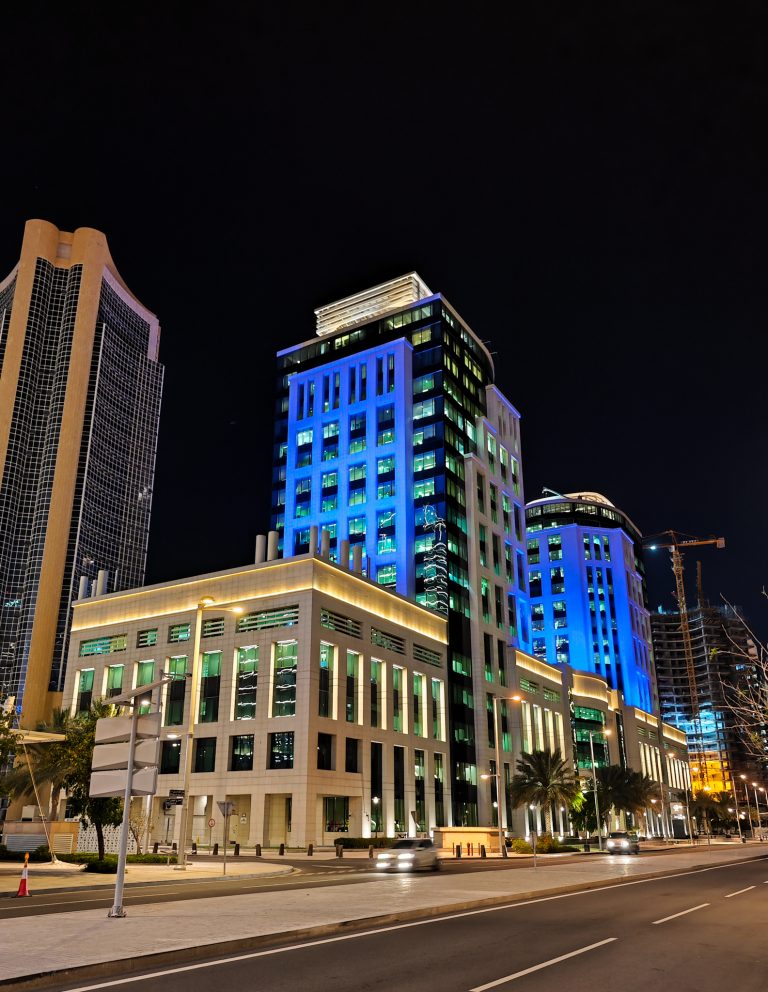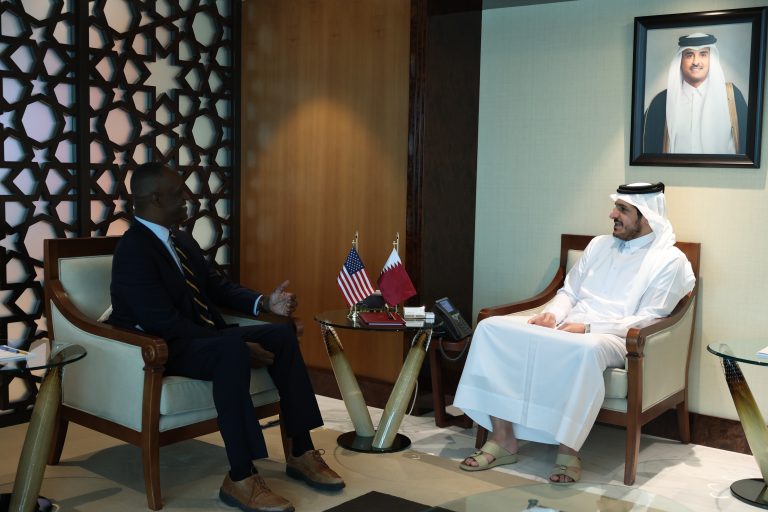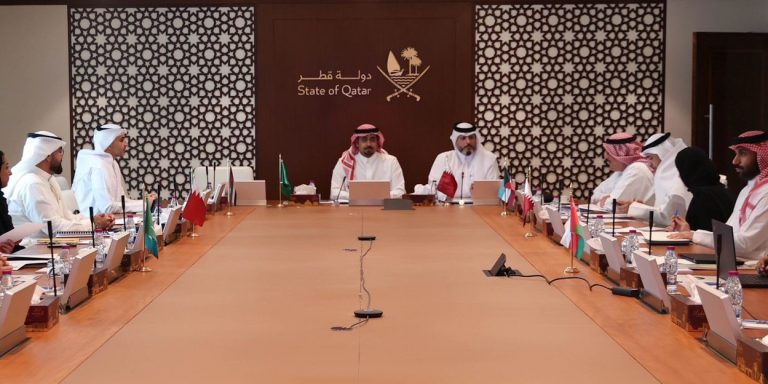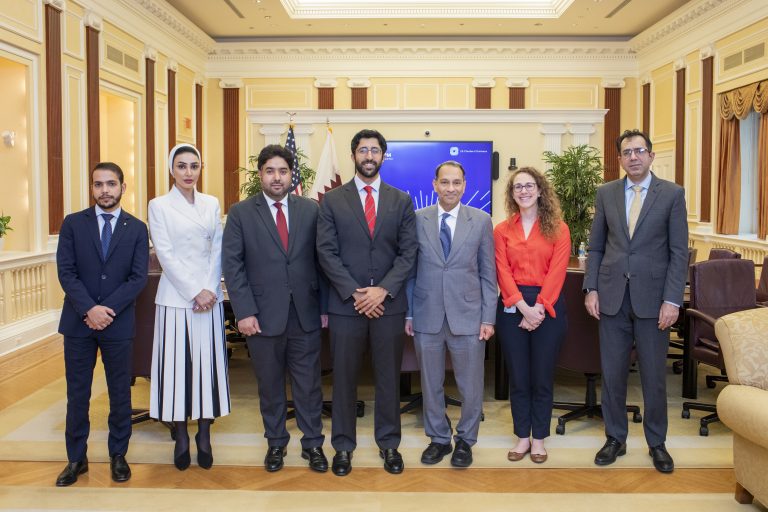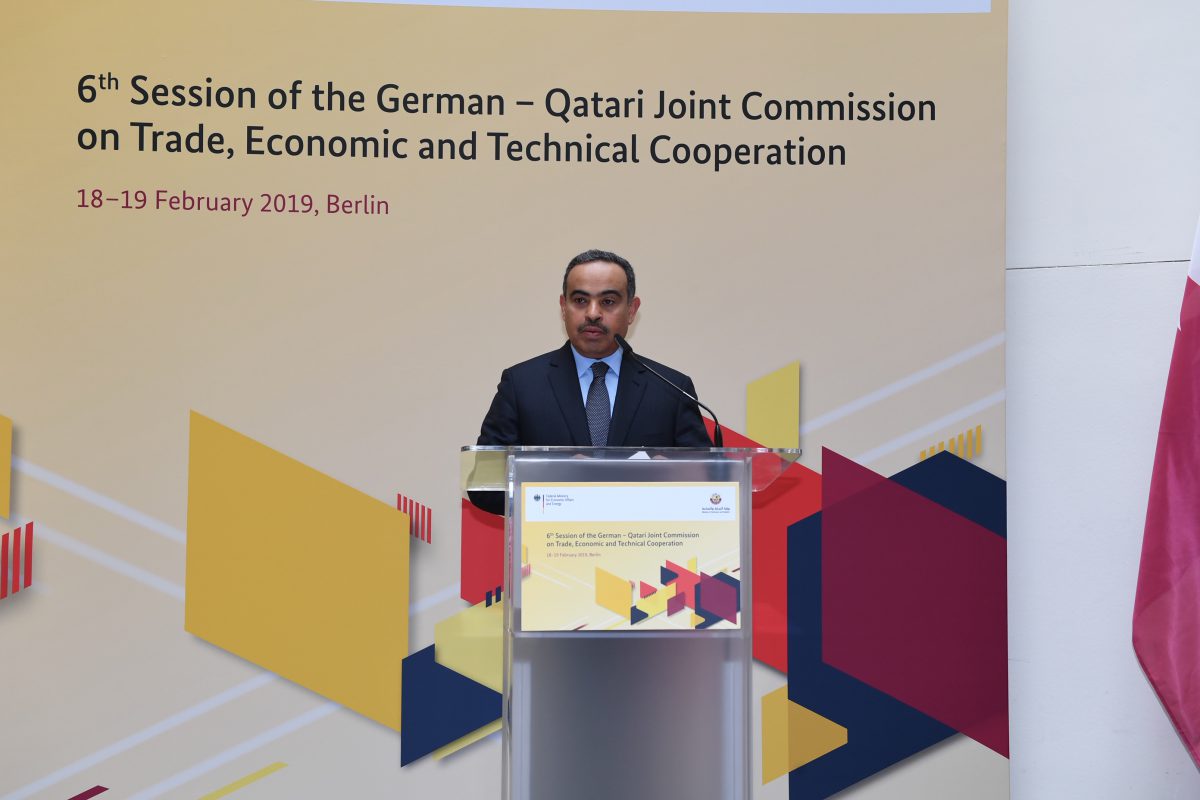
The Sixth Session of Qatari-German Joint Commission on Economic, Trade and Technical cooperation kicked off in Berlin to discuss the development and promotion of bilateral economic and trade relations.
The session was co-chaired by H.E. Ali Bin Ahmed Al Kuwari, Minister of Commerce and Industry, and H.E. Thomas Bareiß, Germany’s Parliamentary State Secretary at the Federal Ministry for Economic Affairs and Energy.
In his opening speech, H.E. Mr. Al Kuwari hailed the close relations between Qatar and Germany, noting that bilateral ties have gained momentum following the historic visit of His Highness the Amir Sheikh Tamim bin Hamad Al-Thani to Germany last September, during which H.H. the Amir announced Qatar’s intention to invest 10 billion Euros to support the German economy over the next five years.
Several important agreements were signed during the session, including one relating to the establishment of the Qatari-German Businessmen Council, which will play a key role in bolstering joint efforts to develop strategic bilateral cooperation.
H.E. highlighted Qatar’s successful participation in the Hannover International Trade Fair marked a new milestone in the historic journey of Qatari-German partnerships.
H.E. noted that Qatar and Germany enjoy close political and economic ties, which have reflected positively on the value of bilateral trade, which reached 1.9 billion euros in 2018, accounting for 1.8 percent of Qatar’s total foreign trade.
H.E. noted that over 300 German companies operating in Qatar play an important role in supporting the development of the country across vital industries including the manufacturing, services, telecommunications, transport and infrastructure sectors, among others.
On the other hand, Germany represents an attractive destination for Qatari investments, which exceeded 25 billion Euros by 2018, H.E. said. Qatar Investment Authority has provided support for various vital areas of the German economy, including the automotive, telecommunications, hospitality, and banking sectors, among other industries.
H.E. outlined the economic policies that Qatar has embraced over the years to accomplish its National Vision 2030.
H.E. said Qatar has adopted integrated strategies to diversify its economy while encouraging the private sector to invest in non-oil activities and sectors such as renewable energy, technology, small and medium-sized industries and infrastructure.
Qatar has also sought to attract foreign direct investments and promote the localization of industries to achieve self-sufficiency and strengthen its economy, H.E. said.
German companies that choose to set up shop in Qatar will find a multitude of investment opportunities to tap, H.E. said, referring to development projects being undertaken within the framework of the Qatar National Vision 2030 and ahead of preparations to host the 2022 FIFA World Cup.
H.E. noted that Qatar’s foreign trade also witnessed remarkable growth in 2018 as exports increased by 25%, while the trade balance hit a surplus of 46.6 billion Euros, an increase of 40% compared to 2017.
In this context, H.E. underscored the importance of pursuing efforts to increase the number of direct flights between Qatar and Germany.
In his concluding remarks, H.E. voiced hope that the Sixth Session of the Qatari-German Joint Commission on Economic, Trade and Technical Cooperation will result in fruitful outcomes in the best interest of both countries.
For his part, H.E. Thomas Bareiß said the joint economic commission is the premier focal point where representatives of government as well as of business meet.
“The German-Qatari economic relations are excellent but there is still room for further deepening. Germany looks forward to fully contribute with its excellent product and services to the diverse economy of Qatar while at the same time inviting Qatar to the strongest economy of the European Union,” H.E added.
During the meeting, both sides welcomed the impetus that had been brought to Qatari-German relations through the visit of H.H. the Amir of Qatar to Berlin last September.
Officials discussed the promotion of bilateral cooperation in the energy, industry, agriculture, transportation, health, education, sports, technology and cultural fields.
Both sides agreed to expand bilateral trade relations through the development of long-term partnerships, while welcoming initiatives undertaken by the private sectors in both countries to strengthen bilateral economic cooperation mechanisms.
Officials also stressed the importance of bilateral investments and their contribution to sustainable economic development.
The two sides agreed to take the necessary steps to advance trade and investment cooperation in a bid to increase bilateral trade and facilitate the flow of goods, services and investments between the two countries.
Both sides agreed to hold the Seventh Session of the Qatari-German Joint Commission in Doha during a date to be mutually agreed.
Both sides also welcomed the development of communication channels to develop the education sector in both countries, particularly in relation to technology and vocational education. Both sides also encouraged participation in education fairs, exhibitions and conferences relating to higher education, scientific research and technology.
For his part, H.E. Sheikh Nawaf Bin Nasser Al Thani, co-Chairman of the German-Qatari Joint Task Force for Trade and Investment, voiced hope that both sides will coordinate efforts to establish action plans to address the challenges facing businessmen in both countries.
H.E. Sheikh Nawaf highlighted the strength of the German economy and signficant developments in the fields of scientific, research, industrial and technology. H.E. noted that Qatar’s unique investment activities in Germany provide further incentives to strengthen investment relations and enhance communication between the business sectors in both countries. H.E. added that the private sector is currently channeling part of the Qatari-German investments into small and medium enterprises, which represents pillars of economic development in both countries.
H.E. Minister of Commerce and Industry and H.E. Germany’s Parliamentary State Secretary at the Federal Ministry for Economic Affairs and Energy, co-signed the minutes of the Sixth Session of the Qatari-German Joint Commission on Economic, Trade and Technical Cooperation.
On the sidelines of the session, H.E. Minister of Commerce and Industry visited the German parliament.
The session brought together H.E. Sheikh Khalifa bin Jassim Al-Thani, Chairman of Qatar Chamber, H.E . Hassan Al Thawadi, Secretary General of the Supreme Committee for Delivery & Legacy, H.E. Sheikh Nawaf Bin Nasser Al Thani, co-Chairman of the German-Qatari Joint Task Force for Trade and Investment, and H.E. Sheikh Saoud bin Abdulrahman Al Thani, the Ambassador of the State of Qatar in Germany along with a number of senior officials, businessmen, decision-makers and investors from both countries.
Panel discussions were held under the theme “From Berlin to Doha: Expert-Panels on Business Opportunities.” The first panel touched on driving economic diversification while the second panel focused on the future of artificial intelligence and smart cities and its impact on business. The panel brought together Mr. Yousuf Mohamed Al-Jaida, Chief Executive Officer, QFC Authority; Mr. Saud bin Abdullah Al Attiyah, Director of Economic Policy and Research Department, Ministry of Finance; Mr. Nabil Mohammed Al Khalidi, Chief Executive Officer at Mawani Qatar; Mr. Abdulla Al-Misnad, Deputy Chief Executive, Qatar Free Zones Authority; Mr. Ibrahim Al Mannai, Executive Director at Qatar Development Bank; Ms. Iman Al-Kuwari, Programmer at the Ministry of Transport and Communications, Mr . Ahmed Al Said of the Qatar Science and Technology Park and Mr. Thomas Liber of Ooredoo.
German speakers included Mr. Oliver Hermes, CEO of WILO SE; Mr. Achim Hartig, Managing Director Investor Consulting at the Germany Trade & Invest (GTAI) agency; Mr. Olaf Hoffmann, CEO of Dorsch Group; Mr. Alexander Tettenborn, of the German Ministry of Economic Affairs and Energy; Mr. Jack Thoms, of the DFKI German Research Institute for Artificial Intelligence; Dr. Steffen Wieczorek of SAP company; Dr. Steffen Gackstätter, from Roland Berger; along with other officials.
H.E. Ali Bin Ahmed Al Kuwari, Minister of Commerce and Industry, met with H.E. Mr. Peter Altmaier, Germany’s Federal Minister for Economic Affairs and Energy. The meeting took place on the sidelines of the Sixth Session of the Qatari-German Joint Commission on Trade, Economic and Technical Cooperation that took place in Berlin.
The meeting focused on the development and promotion of bilateral relations and joint cooperation, particularly in the trade, investment and industrial sectors.
Discussions touched on the recommendations and outcomes of the German Business and Investment Forum that was held last September, and discussed the latest developments relating to the signing of an agreement on the Prevention of Double Taxation and Tax Evasion.
Discussions also touched on the developments that the Qatari economy has witnessed in recent years and the investment incentives that Qatar is offering across various sectors. These include a law regulating the investment of non-Qatari capital in economic activity, and initiatives to support the private sector and bolster its contribution to overall economic development, as well as to attract foreign direct investment and encourage German companies to invest in the Qatari market.




